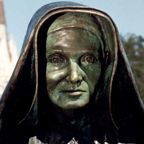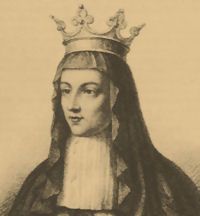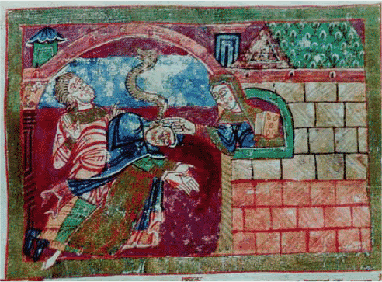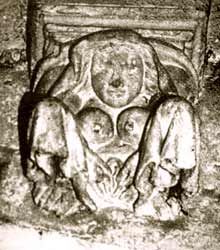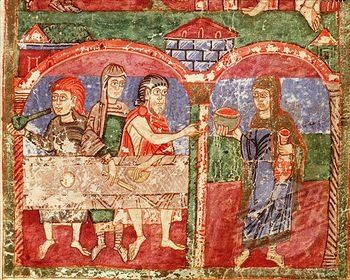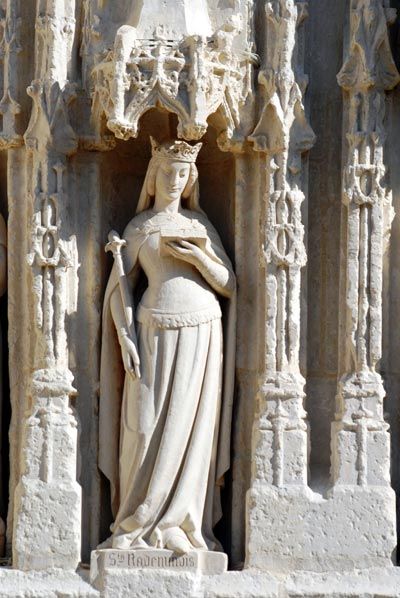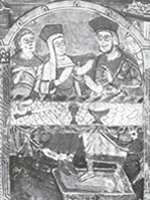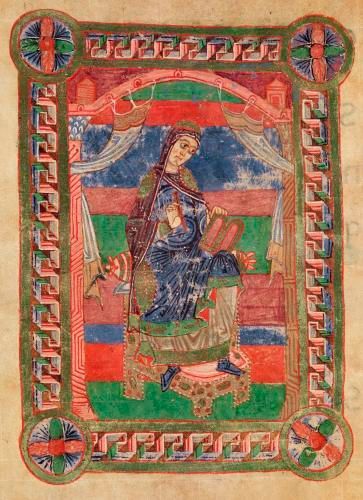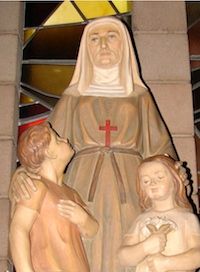Today, we celebrate the feast day of Saint
Blandina (162-177) and the martyrs of Lyons, France. As described in the Roman Martyrology: “At Lyons in Gaul, the
holy martyrs Pothinus, bishop, Sanctus, deacon, Vetius Epagathus, Maturus,
Ponticus, Biblis, Attalus, Alexander, and Blandina, with many others. Their
mighty and repeated contests are confirmed by a letter written from the Church
of Lyons to the Churches of Asia and Phrygia, in the reign of Marcus Aurelius
Antoninus and Lucius Verus. Among these martyrs was Saint Blandina, who though
weaker because of her sex, more feeble in body, and less spirited because of
her servile state, underwent more prolonged and sharper trials. However, her
courage did not fail, and when her throat was cut, she followed to Heaven the
other martyrs whom she had encouraged to victory.”
Saint Blandia was slave to a Christian
family, caring for the young girls of the household. Having witnessed the Gospel from the family she worked for,
Blandina converted to Christianity, despite the violent oppression and
persecution of Christians at the hands of Roman emperor Marcus Aurelius. During his reign, the fanaticism of the
occupants of Lyon had been fanned like flames, and many harassed and mistreated
their Christian neighbors, identifying them to the authorities, and handing
them over to the Roman governor of the region.
Among those identified were Saint Pothinus (also celebrated today), the
bishop of Lyons, Saint Irenaeus (a priest who had been sent to Lyons by Saint
Polycarp), and Saint Blandina.
The accused were imprisoned, and left to
starve for some time, prior to being brought before the imperial legate. All those imprisoned, including Blandina’s
Christian mistress, feared for her life, as she was of slight frame, frail, and
of gentle spirit. Knowing that torture
was to be their lot, they encouraged her to recant her faith, so as to save
herself, but she refused. In the end,
Saint Blandina withstood the most horrific and painful of tortures with joy,
all the while offering encouragement to her companions. It is said that her executioners eventually
became exhausted from their efforts, and grew to respect her quiet courage and
steadfast response to every question or accusation levied against her: "I
am a Christian, and we commit no wrongdoing."
Saint Blandina and her companions were accused of cannibalism, a twisted interpretation of the practice of receiving the Eucharist. The legate, wishing to extract confessions from the accused, continued to offer new and barbaric tortures, eventually beheading those of Roman citizenship (as per the emperor’s decree). However, those who were not citizens, including Blandina, could continue to be tortured.
 Saint Blandina was taken to the town’s amphitheater, known as the Amphitheater
of the Three Gauls, at the time of the town’s public games. She was tied to a rough stake and wild
beasts were set upon her. However, they
did not touch her, and rather laid at her feet. She was left for several days,
with the animals loose beside her, but they never harmed or attacked her. During this time, she was forced to watch
her companions tortured and killed, the last among them her younger
brother. As the last of the martyrs,
she was scourged, burned upon a hot grate over coals, bound in a net and thrown
before a wild steer who trampled her.
Following these tortures, Saint Blandina was killed with a dagger,
ending her suffering, and earning her the crown of martyrdom.
Saint Blandina was taken to the town’s amphitheater, known as the Amphitheater
of the Three Gauls, at the time of the town’s public games. She was tied to a rough stake and wild
beasts were set upon her. However, they
did not touch her, and rather laid at her feet. She was left for several days,
with the animals loose beside her, but they never harmed or attacked her. During this time, she was forced to watch
her companions tortured and killed, the last among them her younger
brother. As the last of the martyrs,
she was scourged, burned upon a hot grate over coals, bound in a net and thrown
before a wild steer who trampled her.
Following these tortures, Saint Blandina was killed with a dagger,
ending her suffering, and earning her the crown of martyrdom.
Her mangled body was placed on display for
six days, and following this indignity, was thrown into the Tiber River so as
to prevent local Christians from burying it.
Miraculously, however, her relics were delivered by the Lord to the
faithful for enshrinement, and were interred in a local church.
Saint Eusebius recorded a letter, sent by
some Christian survivors in Lyons. In
this letter, it was written:
"But
the whole wrath of the populace, and governor, and soldiers was aroused
exceedingly against Sanctus, the deacon from Vienne, and Maturus, a late
convert, yet a noble combatant, and against Attalus, a native of Pergamos where
he had always been a pillar and foundation, and Blandina, through whom Christ showed
that things which appear mean and obscure and despicable to men are with God of
great glory, through love toward him manifested in power, and not boasting in
appearance. For while we all trembled, and her earthly mistress, who was
herself also one of the witnesses, feared that on account of the weakness of
her body, she would be unable to make bold confession, Blandina was filled with
such power as to be delivered and raised above those who were torturing her by
turns from morning till evening in every manner, so that they acknowledged that
they were conquered, and could do nothing more to her. And they were astonished
at her endurance, as her entire body was mangled and broken; and they testified
that one of these forms of torture was sufficient to destroy life, not to speak
of so many and so great sufferings. But the blessed woman, like a noble
athlete, renewed her strength in her confession; and her comfort and recreation
and relief from the pain of her sufferings was in exclaiming, 'I am a
Christian, and there is nothing vile done by us.'
Maturus, therefore, and
Sanctus and Blandina and Attalus were led to the amphitheatre to be exposed to
the wild beasts, and to give to the heathen public a spectacle of cruelty, a
day for fighting with wild beasts being specially appointed on account of our
people. Both Maturus and Sanctus passed again through every torment in the
amphitheatre, as if they had suffered nothing before, or rather, as if, having
already conquered their antagonist in many contests, they were now striving for
the crown itself. They endured again the customary running of the gauntlet and
the violence of the wild beasts, and everything which the furious people called
for or desired, and at last, the iron chair in which their bodies being
roasted, tormented them with the fumes. And not with this did the persecutors
cease, but were yet more mad against them, determined to overcome their
patience. But even thus they did not hear a word from Sanctus except the
confession which he had uttered from the beginning. These, then, after their life
had continued for a long time through the great conflict, were at last
sacrificed, having been made throughout that day a spectacle to the world, in
place of the usual variety of combats.
But Blandina was suspended on a stake, and exposed to be devoured by the wild beasts who should attack her. And because she appeared as if hanging on a cross, and because of her earnest prayers, she inspired the combatants with great zeal. For they looked on her in her conflict, and beheld with their outward eyes, in the form of their sister, him who was crucified for them, that he might persuade those who believe on him, that every one who suffers for the glory of Christ has fellowship always with the living God. As none of the wild beasts at that time touched her, she was taken down from the stake, and cast again into prison. She was preserved thus for another contest, that, being victorious in more conflicts, she might make the punishment of the crooked serpent irrevocable; and, though small and weak and despised, yet clothed with Christ the mighty and conquering Athlete, she might arouse the zeal of the brethren, and, having overcome the adversary many times might receive, through her conflict, the crown incorruptible.
After all these, on the last day of the contests, Blandina was again brought in, with Ponticus, a boy about fifteen years old. They had been brought every day to witness the sufferings of the others, and had been pressed to swear by the idols. But because they remained steadfast and despised them, the multitude became furious, so that they had no compassion for the youth of the boy nor respect for the sex of the woman. Therefore they exposed them to all the terrible sufferings and took them through the entire round of torture, repeatedly urging them to swear, but being unable to effect this; for Ponticus, encouraged by his sister so that even the heathen could see that she was confirming and strengthening him, having nobly endured every torture, gave up the ghost. But the blessed Blandina, last of all, having, as a noble mother, encouraged her children and sent them before her victorious to the King, endured herself all their conflicts and hastened after them, glad and rejoicing in her departure as if called to a marriage supper, rather than east to wild beasts. And, after the scourging, after the wild beasts, after the roasting seat, she was finally enclosed in a net, and thrown before a bull. And having been tossed about by the animal, but feeling none of the things which were happening to her, on account of her hope and firm hold upon what had been entrusted to her, and her communion with Christ, she also was sacrificed. And the heathen themselves confessed that never among them had a woman endured so many and such terrible tortures.
But not even thus was their madness and cruelty toward the saints satisfied. For incited by the Wild Beast, wild and barbarous tribes were not easily appeased, and their violence found another peculiar opportunity in the dead bodies. For, through their lack of manly reason, the fact that they had been conquered did not put them to shame, but rather the more enkindled their wrath as that of a wild beast, and aroused alike the hatred of governor and people to treat us unjustly; that the Scripture might be fulfilled: 'He that is lawless, let him be lawless still, and he that is righteous, let him be righteous still.' For they cast to the dogs those who had died of suffocation in the prison, carefully guarding them by night and day, lest any one should be buried by us. And they exposed the remains left by the wild beasts and by fire, mangled and charred, and placed the heads of the others by their bodies, and guarded them in like manner from burial by a watch of soldiers for many days. And some raged and gnashed their teeth against them, desiring to execute more severe vengeance upon them; but others laughed and mocked at them, magnifying their own idols, and imputed to them the punishment of the Christians. Even the more reasonable, and those who had seemed to sympathise somewhat, reproached them often, saying, 'Where is their God, and what has their religion, which they have chosen rather than life, profited them?' So various was their conduct toward us; but we were in deep affliction because we could not bury the bodies. For neither did night avail us for this purpose, nor did money persuade, nor entreaty move to compassion; but they kept watch in every way, as if the prevention of the burial would be of some great advantage to them.
The bodies of the martyrs, having thus in every manner been exhibited and exposed for six days, were afterward burned and reduced to ashes, and swept into the Rhone by the wicked men, so that no trace of them might appear on the earth. And this they did, as if able to conquer God, and prevent their new birth; 'that,' as they said, 'they may have no hope of a resurrection, through trust in which they bring to us this foreign and new religion, and despise terrible things, and are ready even to go to death with joy. Now let us see if they will rise again, and if their God is able to help them, and to deliver them out of our hands.'"
 |
| Amphitheater at Lyon. The pillar visible is a memorial to the Martyrs of Lyon. |
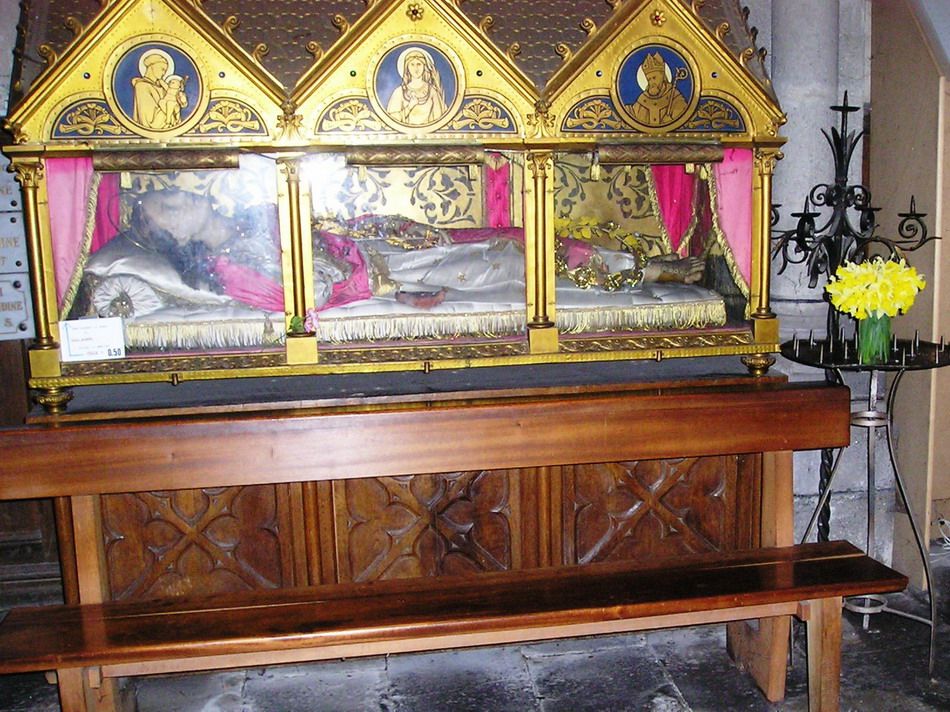 |
| Relics of Saint Blandina |
The life and courage of Saint Blandina and
the Martyrs of Lyon inspire us today to gladly and profoundly profess our
faith. We pray today for the courage and
strength to live our Gospel lives for the world, never shying away from the
truth of Jesus Christ, and His message of peace, hope, and love.
A Prayer for Strength and Courage
My Lord God, through whom strength is made
perfect in weakness,
I pray to you, give me the strength I need.
You have said, that to your children who have no might, you will increase strength.
You have said, that to your children who have no might, you will increase strength.
I am weak. Bless me with a measure of
strength, as may be sufficient for me.
When I am tempted by evil, deliver me, by granting me the power to overcome it.
When I am tempted by evil, deliver me, by granting me the power to overcome it.
When my daily work is too hard for me, give me the
strength to be able to do it.
If my burden oppresses me beyond my bearing, lighten my load, that my strength may be equal to it.
You have helped many, I beg you to help me.
Thank you my Lord. Amen.
If my burden oppresses me beyond my bearing, lighten my load, that my strength may be equal to it.
You have helped many, I beg you to help me.
Thank you my Lord. Amen.



























